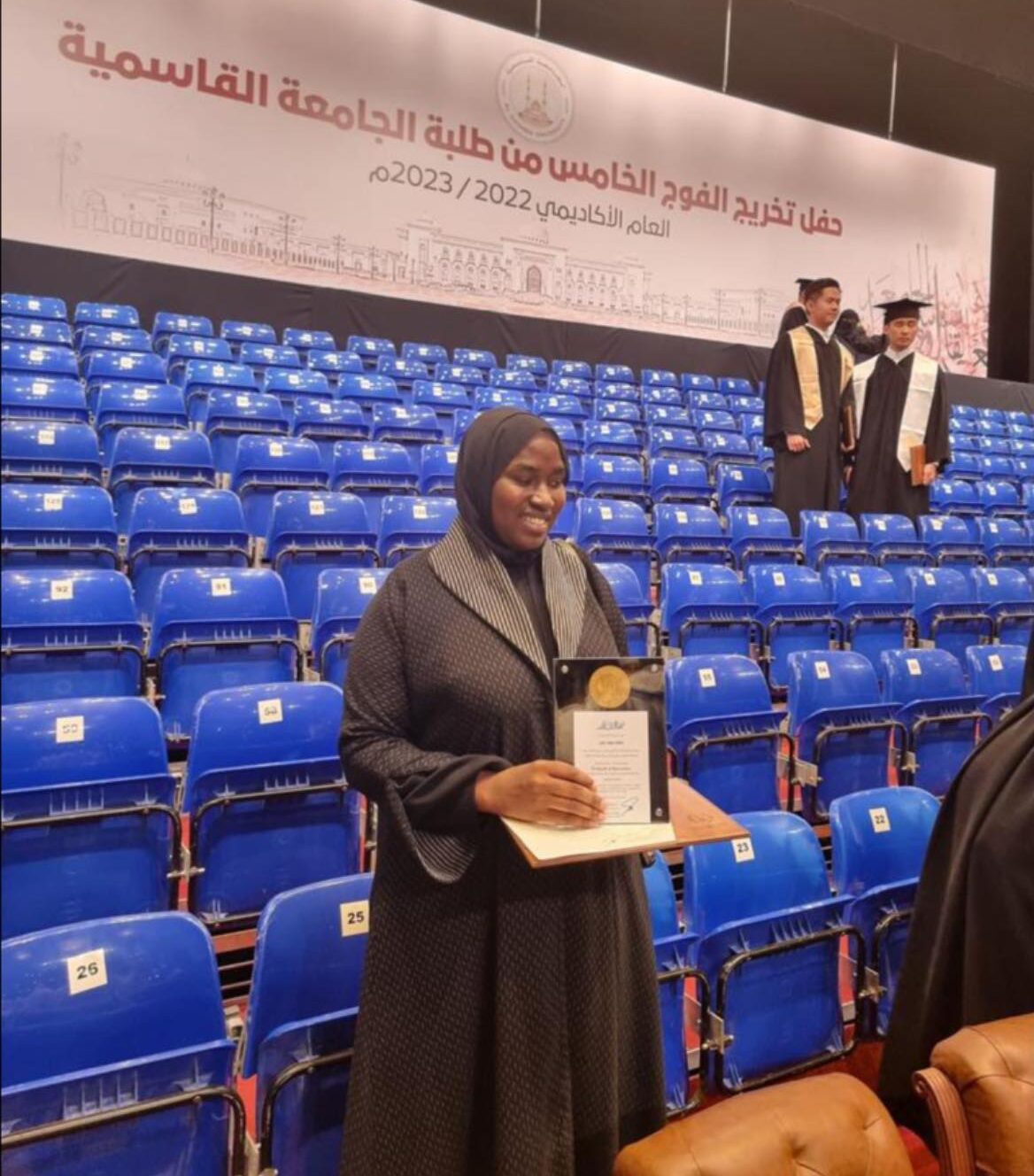Jamila Dawud: the muslim scholar who studied english without going to school

Jamila Dawud built her own voice. She did not inherit it from privilege. She did not acquire it in a formal classroom. And no institution handed it to her on a certificate. She built it, patiently, deliberately, and against the grain of expectation.
Born into a family that did not prioritise girl-child education, Jamila grew up in an environment where formal schooling for girls was considered unnecessary. The path laid before her was narrow and predefined. But even within those constraints, she nurtured a quiet determination to learn.
Her first classroom was the madrasa, where she studied Arabic and immersed herself in Islamic scholarship. That foundation shaped her intellect and sharpened her discipline. Yet she wanted more. Without a teacher, without structured lessons, and without basic formal education, Jamila began teaching herself English, letter by letter, word by word, sentence by sentence.
She listened. She observed. She practised. She stumbled and tried again. Over time, the language that once seemed distant became familiar. She learned to read it fluently. She learned to write it clearly. She learned to speak it confidently.
In a society that underestimated her potential, Jamila refused to underestimate herself. She transformed limitation into leverage and silence into scholarship. Her story is not merely about language acquisition; it is about resilience, faith, and the audacity to educate oneself when the world says you do not need to be educated.
In this Article
Family Life
In a largely conservative Muslim family of one father, three mothers and 15 children, a young Jamila grew up at Zabarma Line in the Ablekuma Central Constituency without ever knowing what attending a secular school felt like.
It was the case that a female child in her family, thus, she and her other three female siblings would only attend the Madrasa (Makaranta) while her male siblings get to go to school and attend Makaranta as well.
Though the sisters would not qualify as illiterate since they had a form of education that guaranteed some knowledge of reading and writing in Arabic, they could not acquire the BECE and the WASSCE which limited their opportunities in life.
The ‘family policy’’ of no secular school for girls however did not deter Jamila from reaching her full potential in life as she explored and perfected different ways of interacting and learning from her environment.
She did it so well that it inured to her benefit of speaking and writing a language that required years of schooling and practice to perfect.
While the decision of being denied access to secular was regrettable, there seems to be much pride in her sense of perseverance and accomplishment that many would think was impossible to think of.
Singing Alphabet and the Black slate
She recalled her first encounter with the English alphabet being through daily interactions with children in her neighbourhood who would playfully “sing” the alphabet to her hearing, especially after school.
Her retentiveness as a girl who strived to commit the Quran to memory got her to master the alphabet orally, “so even though I could sing the alphabet, I didn’t know them,” she told the Ghanaian Minaret in an interview.
Upon the advice of her brother, she graduated her English study of rhyming the alphabet to the ‘slate’, a then commonly used black wooden board for writing which had alphabets and numbers indelibly inscribed on a side of the board.
“Honestly, I was smart enough to know that if ABC is comparable to Alif, Ba’u (Arabic letters), then if “A” is the beginning then the next letter should be “B”.
“I would tell him(brother) that I could read words in Arabic, so I wanted to do the same for English. He then asked me to go back to the slate and pay attention to smaller letters written by the alphabet as I did not know them by then.”
Over time, she perfected the alphabet knowing what the capital and lower cases visibly were, even though she admitted not knowing what they signified except that writing words begin with capital letters, and it continued with small letters (lower cases).
Pronunciation challenge
From a home with no television by then, her exposure to the media through watching television from neighbours and having access to laptop devices of male siblings got her to hear the language being spoken and allowed her to discover new words.
She recollected that she would from time to time ask for the meanings of these new words from school-going friends and family members.
She would later deploy her skill of searching for word meanings in the Arabic dictionary to English, hence improving her ability to independently look up the meaning of words in English.
Long before Google had launched its Google Translate programme in 2006, she recalled being a laughing stock due to challenges with word pronunciation because of her limited knowledge of phonetics.
“I didn’t know anything about the silent ‘K’, and I would try pronouncing words such as ‘knock’ and ‘knife’ with the ‘K’ sound and I would be laughed at. Pronouncing words like ‘neighbour’ was very difficult for me. Things got easier for me with the coming of google translate” she recalled.
Arabic student turned English Teacher
Mallama Jami as she is affectionately called by her students would go through the Makaranta system in the community and later attend an Arabic evening school at the Ghana Lebanon Islamic School (GLIS).
Upon completion, she got a scholarship to Al Qasimiya University in the United Arab Emirates (UAE) where she studied Sharia (Islamic law) and had the opportunity to take “English 1” and “English 2” courses during her study.
She disclosed that she would carefully associate and interact with colleagues from English-speaking countries such as the United States (US) to improve her English language skills.
Upon her return in 2018, she was posted to her alma mater for her national service where she had preferred to work with the Arabic evening school since she felt competent teaching Arabic.
To her disappointment, however, that would not happen as the school was seeking the services of English-speaking graduates to teach students at the junior and senior high levels.
Hesitant at first, she said: “I told them that my proficiency in English was low, and I said to him (headmaster) in English that I could not teach English speakers. He then asked me what language we were communicating with, and I said English.”
“I told him my inadequacies will eventually show when he grants me an official interview. He then replied that he has already conducted the interview and that our conversation which lasted for more than 15 minutes in English was enough for him” she said.
She noted that she taught students at the Junior High level the subject of Arabic literature “and for two days the headmaster would come around to supervise my class”.
The headmaster later decided to give her the task of teaching Islamic Religious Studies (IRS) to students which she said forced her to study harder and prepare well for the task of teaching Senior High School students.
This added task would motivate her out of the fear of “disgracing herself in front of the student” to improve her knowledge of the English language.
Graduation
In April this year, Jamila Dawud was among 1281 students who graduated from the first congregation ceremony of the University of Media Arts and Communication – Ghana Institute of Journalism where she pursued a Master of Arts Degree in Public Relations.
For someone who is into spreading the teachings of Islam, she said she was at a crossroads of furthering her study either in linguistics, public relations (PR), or literature.
Her choice of PR as an area of study, she noted was to improve her skill as a good communicator and help her rebrand her propagation activities.
She was hoping to practice in a corporate setting one day but was keen on ensuring that the profession would not take her away from her calling of teaching people about Islam.
“I find fulfilment in Dawah (call to Islam), so I did the PR to serve my main area of study which is Sharia,” she stated.
She founded Darul Ahkaam li Nisai, an Islamic learning centre for women, is also an advocate for the intellectual and financial empowerment of women to reduce inequalities and discrimination within the Muslim community.
On May 25, 2023, her alma mater, Al Qasimiya University, honoured her with the Distinguished Graduate Award in Community Service. She delivered a speech at the graduation ceremony attended by 264 students from 44 nationalities.
From a girl denied a classroom seat to a scholar addressing an international audience—her journey speaks for itself.
Mallama Jamila is married with a child.
Join our whatsapp channel for all the latest updates.
For news coverage, article publication, and advertisement, send an email to ghanaianminaret@gmail.com or reach us via whatsapp, telegram or phone call on +233266666773.

